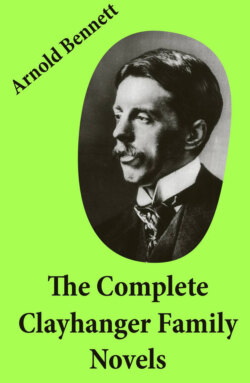Читать книгу The Complete Clayhanger Family Novels (Clayhanger + Hilda Lessways + These Twain + The Roll Call) - Arnold Bennett - Страница 100
На сайте Литреса книга снята с продажи.
Five.
ОглавлениеTo Darius there was no business quite like his own. He admitted that there were businesses much bigger, but they lacked the miraculous quality that his own had. They were not sacred. His was, genuinely. Once, in his triumphant and vain early manhood he had had a fancy for bulldogs; he had bred bulldogs; and one day he had sacrificed even that great delight at the call of his business; and now no one could guess that he knew the difference between a setter and a mastiff!
It was this sacred business (perpetually adored at the secret altar in Darius’s heart), this miraculous business, and not another, that Edwin wanted to abandon, with scarcely a word; just casually!
True, Edwin had told him one night that he would like to be an architect. But Darius had attached no importance to the boyish remark. Darius had never even dreamed that Edwin would not go into the business. It would not have occurred to him to conceive such a possibility. And the boy had shown great aptitude. The boy had saved the printing office from disaster. And Darius had proved his satisfaction therein, not by words certainly, but beyond mistaking in his general demeanour towards Edwin. And after all that, a letter—mind you, a letter!—proposing with the most damnable insolent audacity that he should be an architect, because he would not be ‘happy’ in the printing business! ... An architect! Why an architect, specially? What in the name of God was there to attract in bricks and mortar? He thought the boy had gone off his head for a space. He could not think of any other explanation. He had not allowed the letter to upset him. By his armour of thick callousness, he had protected the tender places in his soul from being wounded. He had not decided how to phrase his answer to Edwin. He had not even decided whether he would say anything at all, whether it would not be more dignified and impressive to make no remark whatever to Edwin, to let him slowly perceive, by silence, what a lamentable error he had committed.
And here was the boy lightly, cheekily, talking at breakfast about ‘going in for architecture’! The armour of callousness was pierced. Darius felt the full force of the letter; and as he suffered, so he became terrible and tyrannic in his suffering. He meant to save his business, to put his business before anything. And he would have his own way. He would impose his will. And he would have treated argument as a final insult. All the heavy, obstinate, relentless force of his individuality was now channelled in one tremendous instinct.
